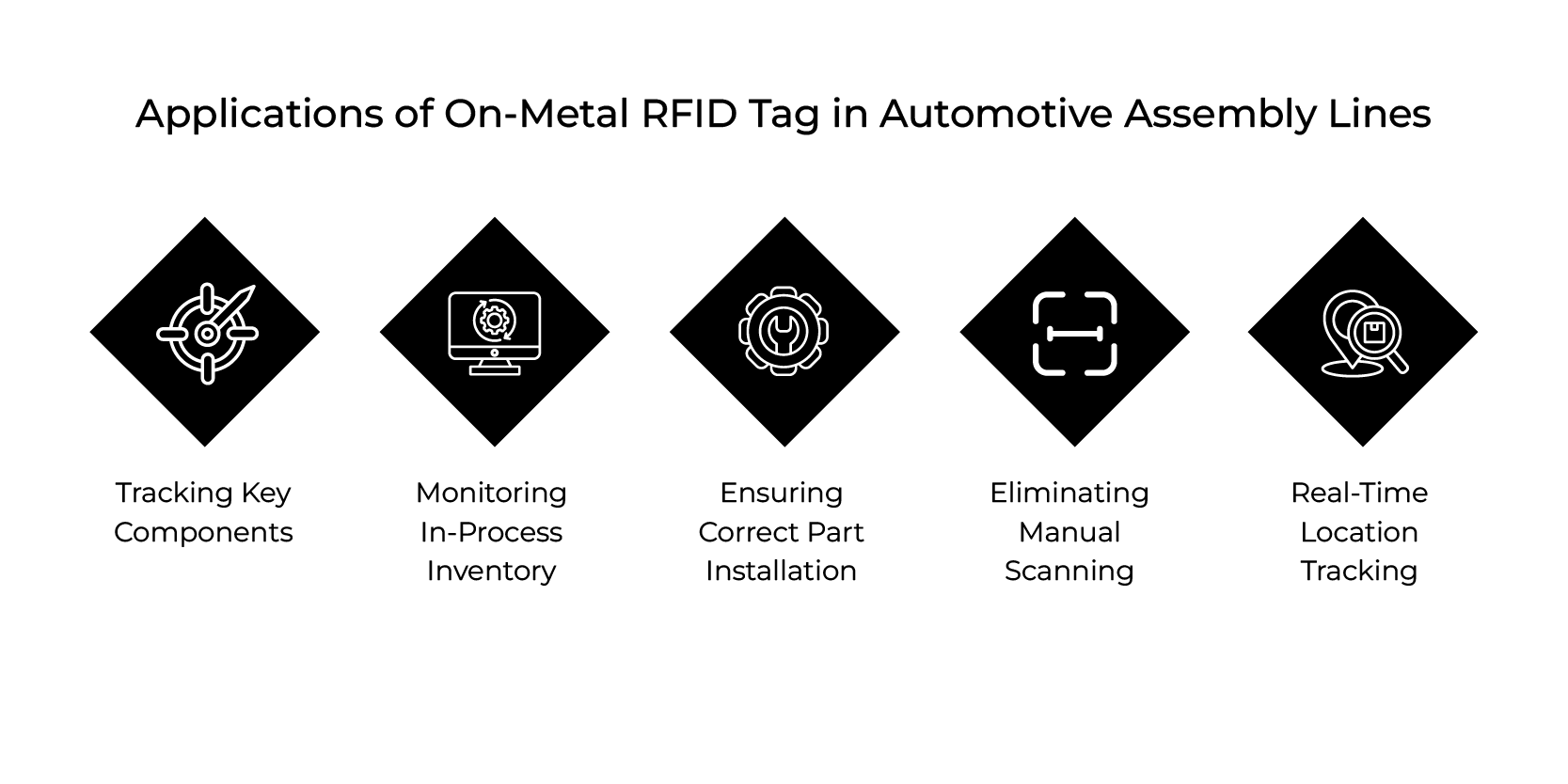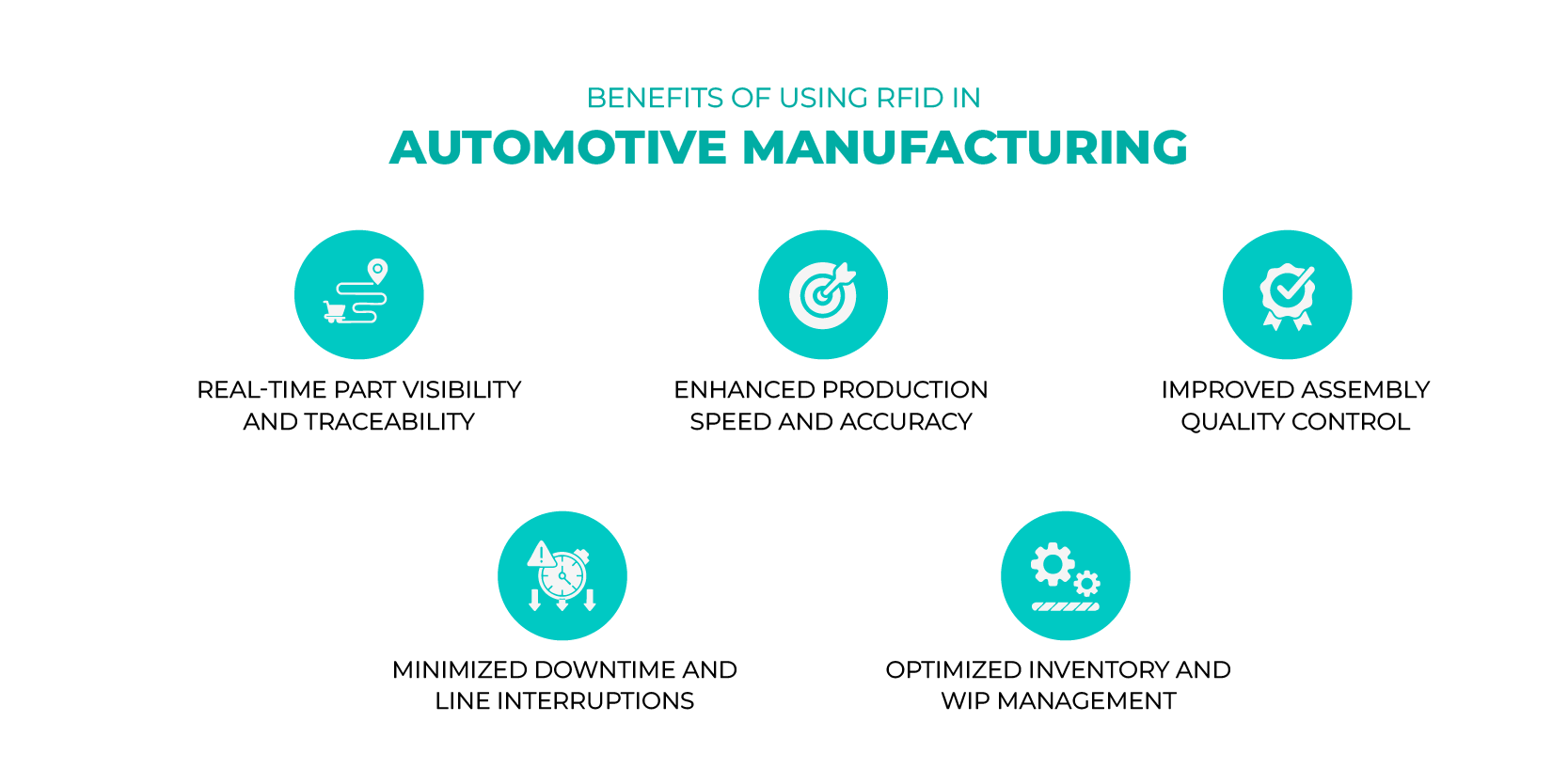RFID in Automotive Manufacturing: Tracking Parts with On-Metal Tags
Automotive manufacturing is a highly complex, precision-driven process involving hundreds of individual components, each with specific roles in the production line. Radio Frequency Identification (RFID) technology is helping to simplify this complexity by enabling faster, more accurate, and automated tracking of vehicle parts.

One of the most effective innovations in this space is the use of on-metal RFID tags—a specialized form of RFID designed to function reliably on metallic surfaces. These tags are increasingly being deployed to track critical parts like engines, chassis frames, and axles across the automotive assembly line.
The Need for Accurate Part Tracking in Automotive Manufacturing
Today’s automotive supply chains rely heavily on just-in-time (JIT) and lean manufacturing principles. That means every part must arrive at the right place, at the right time, in perfect condition.
Traditional methods like barcodes or manual logs are often too slow, prone to human error, and difficult to maintain in rugged, fast-paced industrial environments. Mistakes in tracking can lead to:
- Production delays
- Costly recalls
- Quality control issues
- Compliance failures
RFID, particularly on-metal RFID, provides a smarter and more reliable approach to managing the increasing complexity of automotive production.
What Are On-Metal RFID Tags?
RFID works by using radio waves to transmit data stored on a tag to a reader device. However, metal surfaces interfere with standard RFID tags, distorting signals and rendering them ineffective.
On-metal RFID tags are engineered specifically to overcome this problem. These tags often have a special insulating layer or housing that prevents signal interference, allowing accurate reads even when affixed directly to metal.
One reliable solution widely used in the industry is TagMatiks RFID On-metal Labels. These labels are specially designed for use on metallic surfaces, combining strong adhesion with high-performance read accuracy, making them ideal for automotive manufacturing environments.
Key Advantages:
- Reliable scanning on metal parts
- Durability in harsh environments
- High memory capacity for storing detailed part info
- Variety of form factors to fit different components
Applications of On-Metal RFID Tag in Automotive Assembly Lines

On-metal RFID tags are transforming how automotive manufacturers track and manage parts on the production floor.
Tracking Key Components: On-metal RFID tags are used to identify and track critical parts such as engines, transmissions, axles, and chassis frames as they move through the assembly line.
Monitoring In-Process Inventory: These tags enable real-time visibility of parts as they travel along conveyor systems, helping maintain inventory accuracy throughout production.
Ensuring Correct Part Installation: RFID ensures that the right part is installed at the right station, reducing the risk of assembly errors and improving quality control.
Eliminating Manual Scanning: By automating part identification, RFID reduces reliance on manual barcode scanning, saving labor time and minimizing human error.
Real-Time Location Tracking: On-metal RFID tags support real-time tracking of high-value or mission-critical components, enabling quick retrieval and better security.
Benefits of Using RFID in Automotive Manufacturing
Implementing RFID technology—especially on-metal tags—provides automotive manufacturers with tangible benefits across operations, quality, and business outcomes:

Real-Time Part Visibility and Traceability
Track individual parts and subassemblies throughout the production process and supply chain, minimizing mix-ups and enhancing accountability.
Enhanced Production Speed and Accuracy
Automate part identification and reduce manual intervention, accelerating workflows while lowering the chances of operator error.
Improved Assembly Quality Control
Ensure the correct parts are installed at each station, supporting zero-defect initiatives and simplifying compliance with quality standards.
Minimized Downtime and Line Interruptions
Instantly detect missing or misrouted components to prevent delays, enabling proactive issue resolution on the line.
Optimized Inventory and WIP Management
Maintain accurate in-process inventory levels and location data to support just-in-time (JIT) strategies and reduce excess stock.
These benefits translate into lower costs, faster time-to-market, and improved customer satisfaction.
RFID tags for Automotive Manufacturing
Automotive manufacturers rely on durable RFID solutions to track parts efficiently. TagMatiks RFID On-metal Labels, TagMatiks Gorilla RFID Tag, and TagMatiks Pre-printed/Pre-encoded On Metal RFID Labels offer reliable performance on metallic surfaces. For extreme environments, On Metal Hard Tags provide rugged, long-lasting identification, enabling seamless automation and part traceability across the assembly line.
Conclusion
On-metal RFID tags are revolutionizing how automotive manufacturers track, manage, and optimize part flow on the assembly line. They offer unmatched accuracy, durability, and real-time insights, making them ideal for the demanding environments of automotive plants.
Now is the time for automotive leaders to evaluate RFID not just as a technology upgrade, but as a strategic enabler of efficiency, quality, and competitiveness.
Frequently Asked Questions (FAQs)
Why is RFID important in automotive manufacturing?
RFID provides real-time visibility of parts and components, ensuring accuracy in production lines and reducing delays.
What challenges do metal surfaces pose for RFID tags?
Metal interferes with radio signals, making standard RFID tags unreliable. This is why specialized on-metal RFID tags are required.
What are on-metal RFID tags?
On-metal RFID tags are engineered with shielding or spacers that prevent signal distortion, enabling accurate reads on metallic surfaces.
How do on-metal RFID tags improve parts tracking?
They allow manufacturers to identify, locate, and monitor parts throughout assembly, storage, and distribution, reducing errors and misplacements.
Can RFID help with quality control in automotive manufacturing?
Yes. RFID enables traceability of each part’s origin, batch, and inspection history, supporting compliance and reducing defects.
Are on-metal RFID tags durable enough for automotive environments?
Absolutely. These tags are designed to withstand heat, vibration, oil, dust, and harsh industrial conditions.
How does RFID reduce costs in automotive manufacturing?
By automating tracking, RFID reduces manual labor, inventory errors, and production downtime, leading to significant cost savings.
Recent Posts
-
What Is an RFID Self-Checkout System? A Complete Guide for Retailers
Introduction Retail checkout has seen a remarkable transformation over the years. What started with …Feb 27th 2026 -
Upgrade from Barcodes to RFID on Shopify: A Retailer’s Guide
Retailers on Shopify are beginning to question whether barcodes are enough. With rising customer exp …Feb 24th 2026 -
Work-in-Progress Tracking with RFID in Manufacturing
Introduction In manufacturing, Work-in-Progress (WIP) refers to items that are in various stages of …Feb 20th 2026




